The Baseline: How to Create Long-Term Happiness
The quest for happiness is a rollercoaster of highs and lows. But can we build long-term happiness? I think it’s possible. Let me explain. With cupcakes.

The first time I left the United States, I was 100% sure I was about to have the best experience of my life.
This was a trip Nate and I had been talking about since high school — it was supposed to be the big trip after high school graduation — and after years of "saving up", delays, and excuses, I finally had my ticket.
My mood improved steadily as the trip grew closer, dipping slightly a week out when the "why am I not leaving neeaaooooowwwww" fit of whinery kicked in, spiking up drastically when my feet touched non-American soil for the first time.
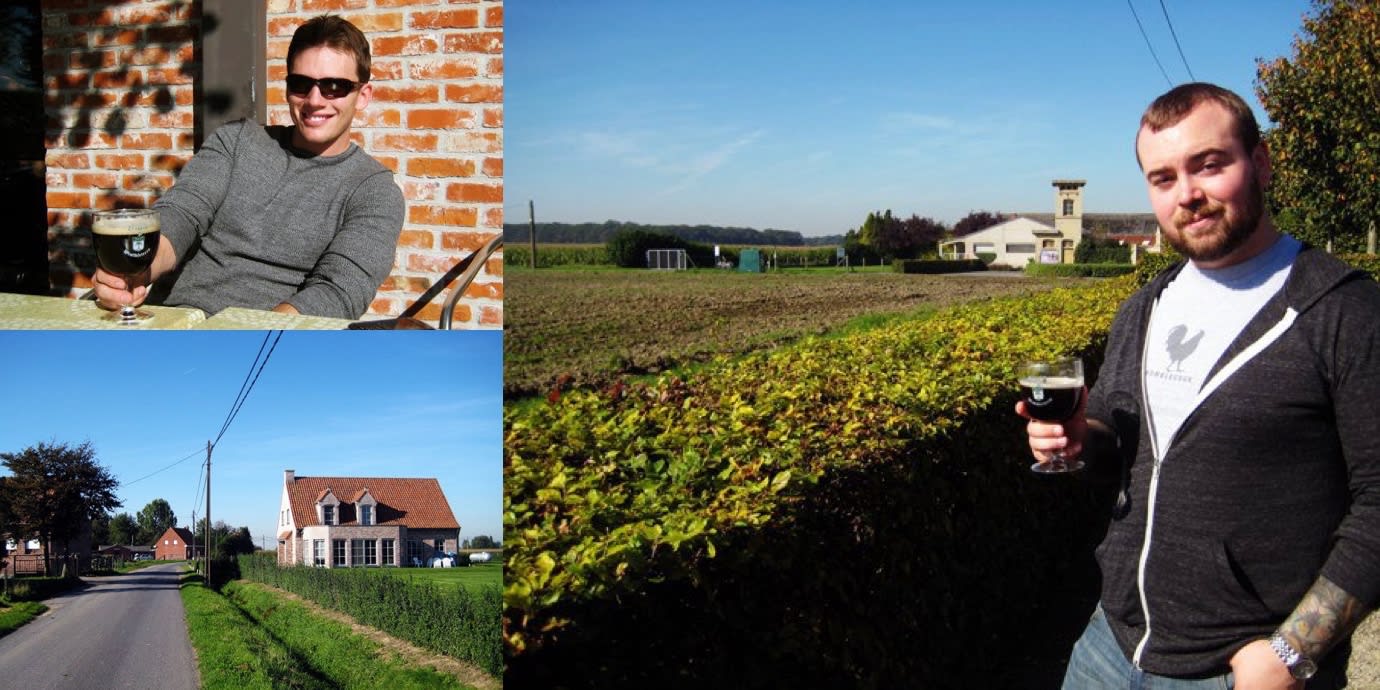
I was able to keep the good times rolling until a few days after coming home, feeding on the envy of my family and friends as I flipped through photos and told stories.
But then came the drop. And it was no small thing; this was the precipitous, stomach-jumps-to-the-throat variety of emotional free-fall.
I sank low. For years I'd been looking forward to this trip.
But now? It was all over.
I had nothing to look forward to. I started to worry I may never feel that kind of happiness again.
My incredible high was matched by an equally crushing low.
Finding happiness the hard way
It's tempting to measure only by extremes.
Happiness, especially, tends to be noticed only at its heights, or in its utter absence.
A "happy person" is a walking highlight reel: a dream wedding with a romantic destination honeymoon chaser; a new puppy to round out graduation and the start of a promising career; a bucket list vacation photo series with a first-class-upgrade cherry on top.
Our high points are often the only metric used to determine how happy we are. And thanks to the latent one-upsmanship we all tend to suffer from, in order to "stay happy" we need to reach for higher and higher highs.
More exotic vacations. Bigger adventures. Go further, go harder, do more, or else you'll be sad.
If we only chase higher highs, we're opening ourselves up for lower lows.
The catch with focusing only on the ups, though, is that it ignores a fundamental truth: life happens in swings.
If the highs are getting increasingly higher, we stand to experience even lower lows.
My big trip, for example, was the highest high I'd reached at that point in my life. So on the downswing — when the trip was over, and all my anticipation, planning, and experiencing were behind me — I was crushed.
Here's a simpler example: say you've got a cupcake
This cupcake looks amazing. It's still warm from the oven. It's the perfect mix of moist and springy. The icing is buttercream, made from scratch. It's filled with freakin’ salted caramel.

As you look at it on your plate, you think about how great it will taste. Your Pavlovian cupcake response kicks in and you drool and lick your lips and your palms sweat and you close all the curtains so you can be alone for this.
And then — oh god — you take a bite. Holy dammit Christmas this is a good cupcake. The world fades away, and it's just you and this cupcake and "Endless Love" playing in the background.
But then, just as quickly as it started, it's all over. Even as you desperately lick your fingers, the crushing weight of reality settles on you: the cupcake is gone.
Where once you soared on the sugary wings of eagles, you now wallow in the bitter depths of sadness. Never again will you have this cupcake. Never again will this heavenly confection pass your lips.
The cupcake is gone. The plate is empty.
You are alone.
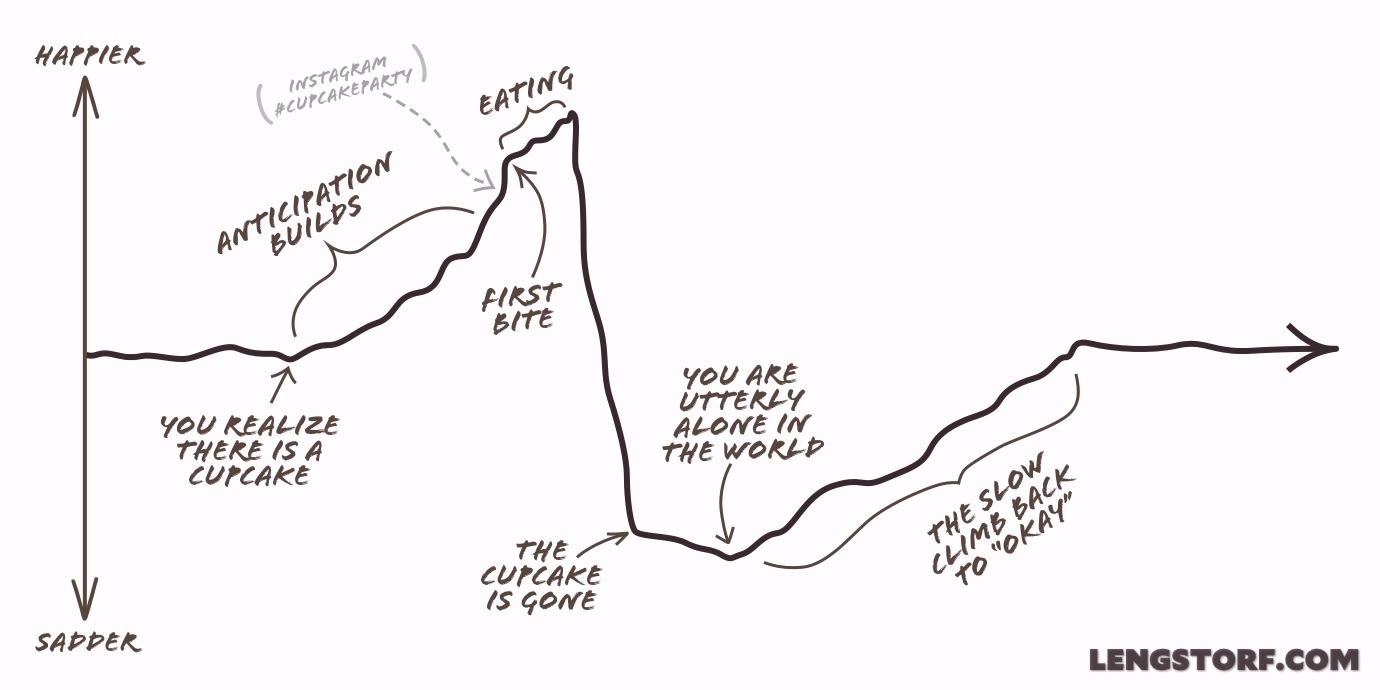
Minutes pass, feeling like years. The world is cold and flavorless. All color has bled from this miserable world without cupcakes.
But no! This is not the end. You are strong. You've lived without cupcakes before, and goddammit you can live without them now.
You don't know how, but life will continue, step after merciless, unsprinkled step, until — somehow, someday — hope returns.
How to create long-term happiness: focus on the baseline
For most of my teens and twenties, I chased happiness as a sort of destination. I'd see something shiny, struggle toward it, achieve it, feel amazing for the briefest of moments, and then plunge into the existential quagmire of existing without goals — until I saw something shiny.
It was a strange sort of holding pattern, where I'd oscillate between euphoria and angst, always at about the same frequency. My average happiness, if we look at the highs and lows on a graph, stayed about the same.
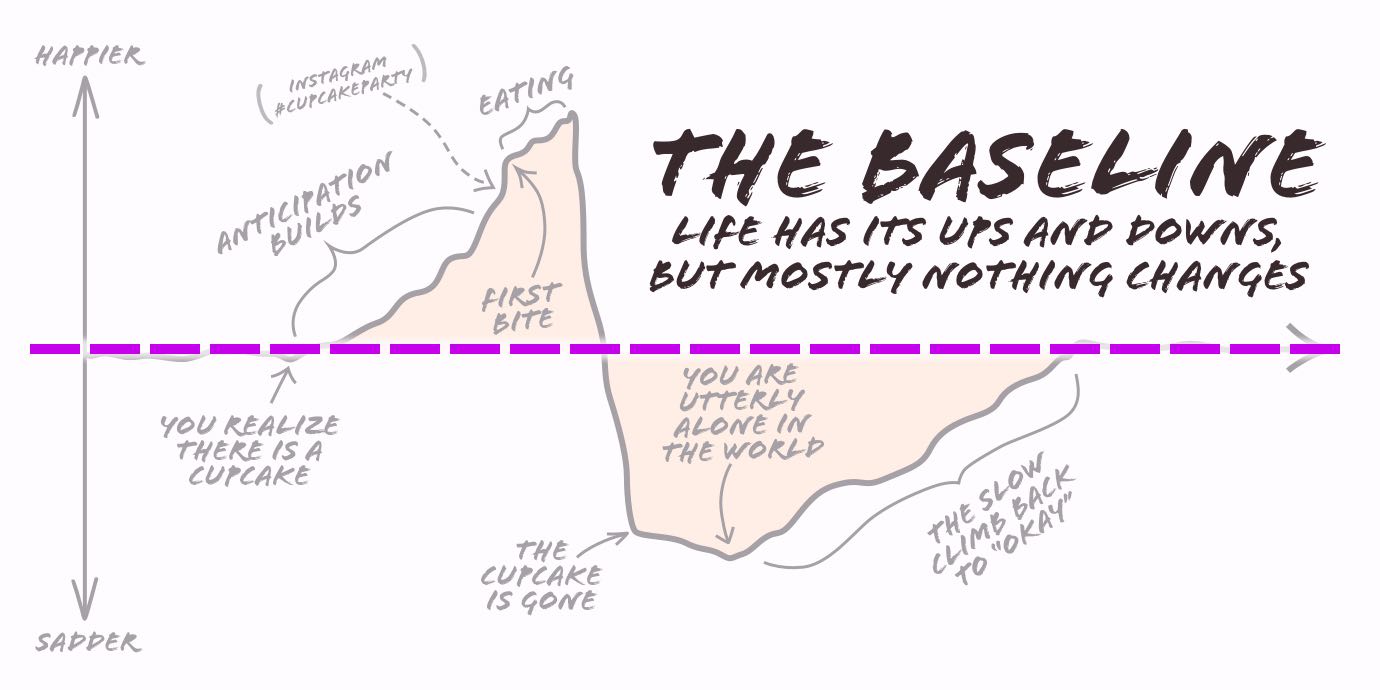
I was pretty happy sometimes, and pretty sad sometimes, and mostly nothing changed.
Don't live in a world where the best cupcakes are behind you.
Since we generally acclimate to circumstances pretty quickly, staying the same often feels like things are getting worse.
And that is where things get ugly, because when we make predictions about how we're going to feel, they tend to be self-fulfilling prophecies.
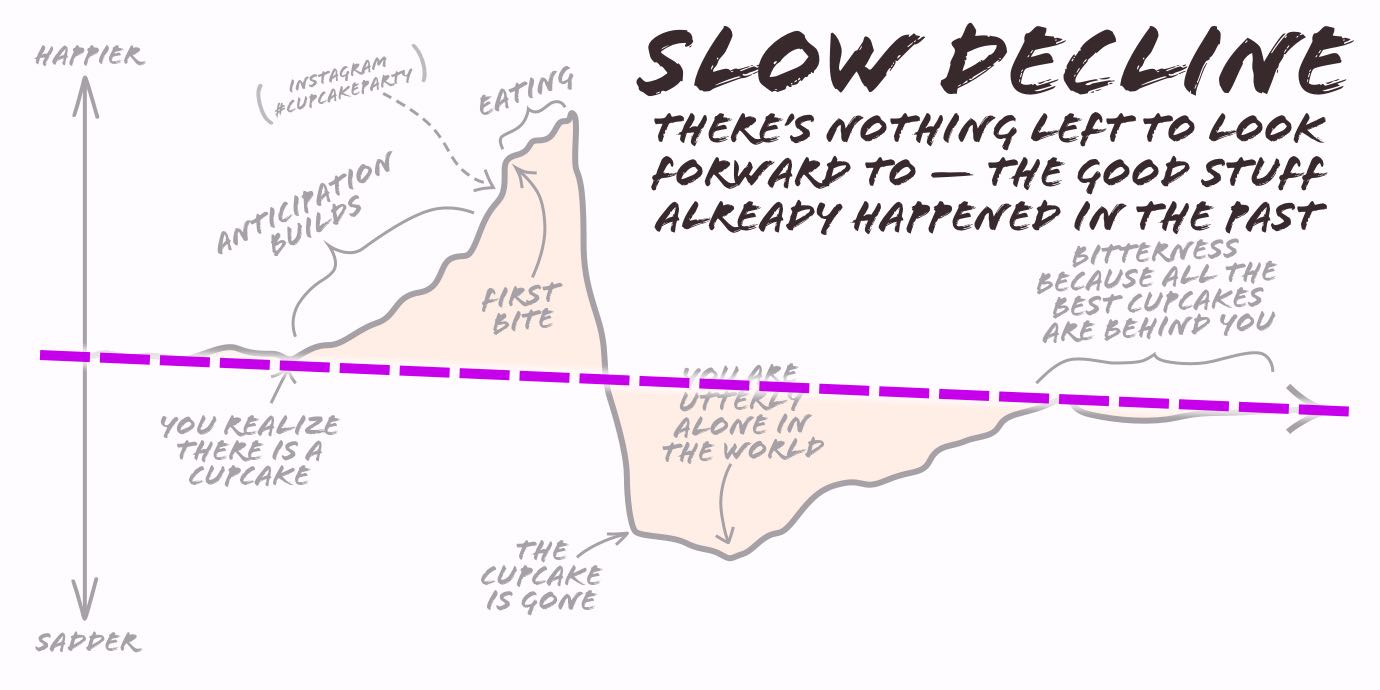
If I believe that things are in decline, and all the good stuff happened in the past, it's a short jump to resigning myself to a life where the best years are behind me.
This is where bitterness comes from, and the suspicion that there's only so much happiness (or love, or money, or whatever) in the world, and that someone else is getting your share.
And if we look at happiness as a zero-sum game, we all lose.
How to have higher (crash-free) highs
So if you'll humor me, let's all agree that the following assumptions hold true:
- Chasing happiness as destinations leads to seeking higher highs, with the accompanying lower lows.
- This leads to a baseline happiness that more or less stays flat.
- A flat baseline happiness can start to feel like things are stagnating and/or getting worse.
- This can lead to believing things are actually getting worse.
- If we start to believe our best years are behind us, we become bitter and unhappy.
With all of that laid out, we'd be hard-pressed to find many benefits to this approach.
So what are our alternatives?
Are you ready for me to stop talking about cupcakes?
Going back to our cupcake example, what if we made one simple adjustment?
What if, instead of seeing the cupcake as the reason for our happiness, we look at it as a starting point?
Maybe our thought process goes something like this:
This cupcake looks amazing. How do you make a cupcake look this good?
And holy shit — it tastes as good as it looks. How do you make a cupcake taste this good?!
I should try and make cupcakes. I bet I can make pretty good ones.
Instead of a deep crash when the cupcake is gone, we come out of the experience with a new goal: we're going to learn how to make cupcakes that taste this good.
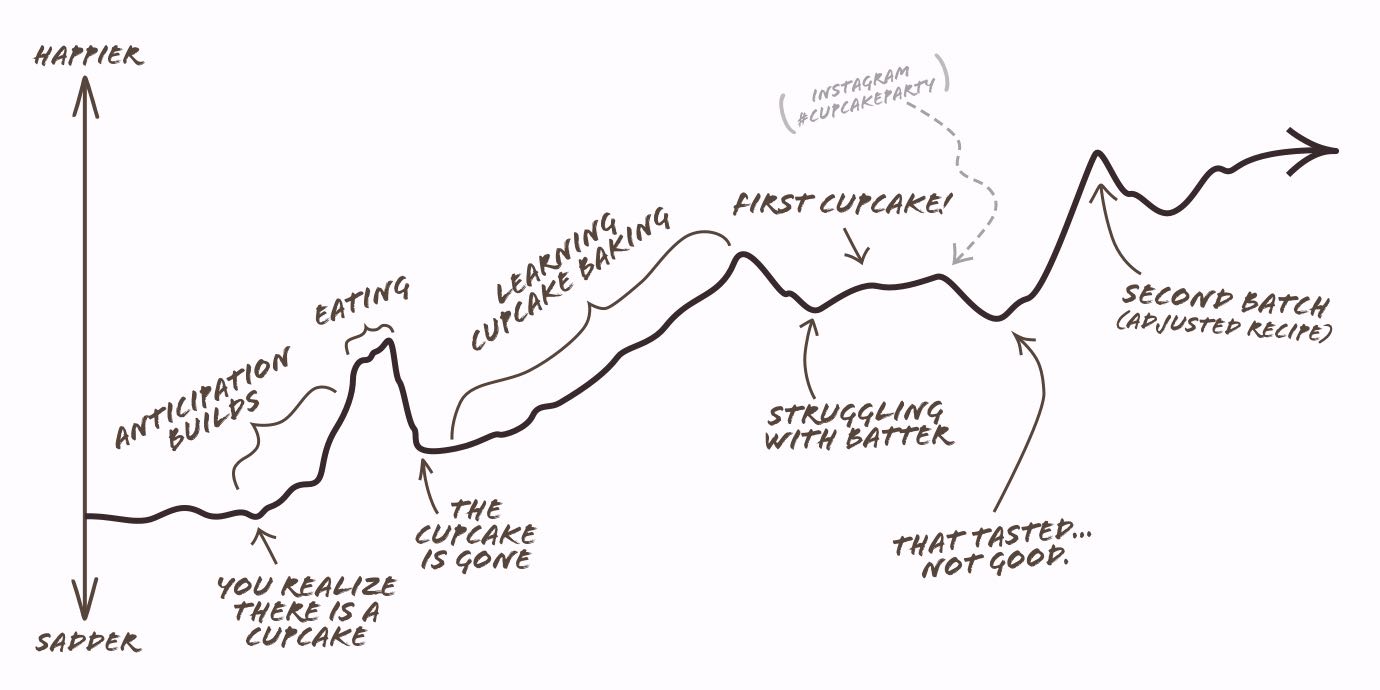
This means we have something else to look forward to — we're not left without a goal once the cupcake is gone — and we get to chase our curiosity.
Each new experience brings us happiness and gives us new ideas to pursue.
By looking at each new experience as a step instead of a destination, we're reducing the full depths of the crash. And that's really important.
If our post-high crashes are less extreme than our highs, our baseline happiness will increase over time.
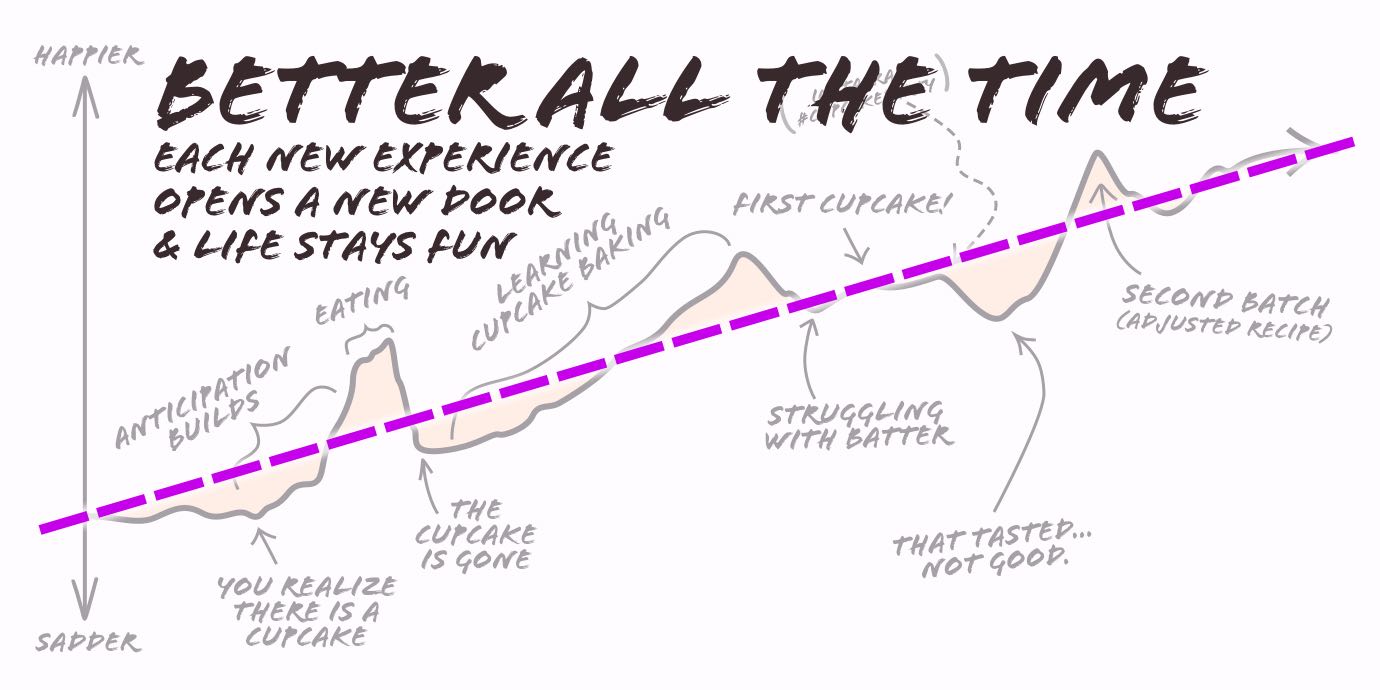
It's a subtle shift: instead of thinking, "I'll be happy when...", we think, "This will be fun to try."
Removing the focus on the destination makes the whole process a reward, instead of just the outcome. On top of that, learning something almost always exposes new things to learn, and — if you give yourself permission to keep learning — that means you'll always have some interesting thread to tug at.
What's your baseline?
Which way is your baseline trending? And what could you do today to get it trending upward? Share your action step.